Data Manager Resume Examples

Jul 18, 2024
|
12 min read
Craft a standout data manager resume: Organize your experience, highlight key skills, and land the interview!
Rated by 348 people
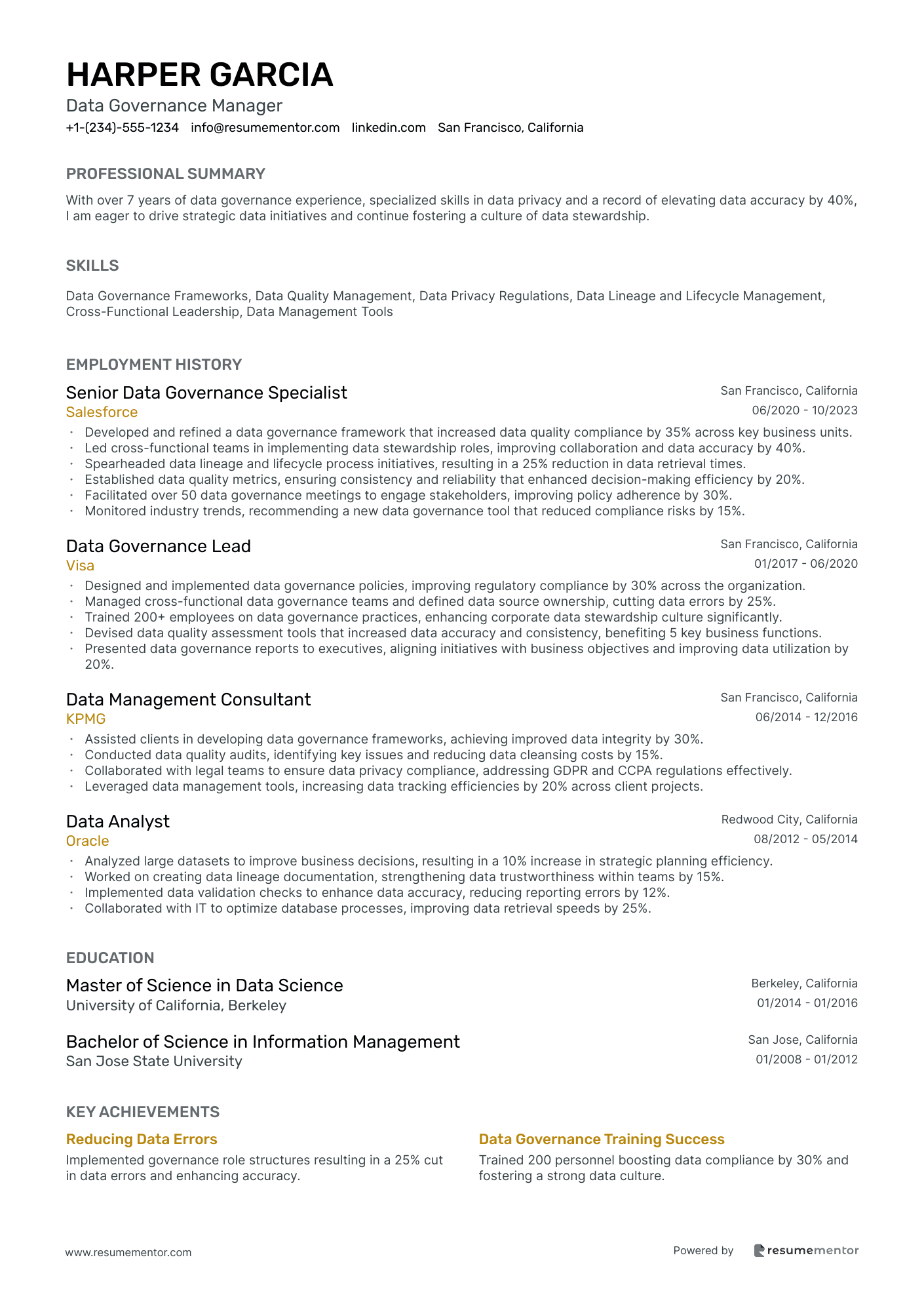
Data Governance Manager
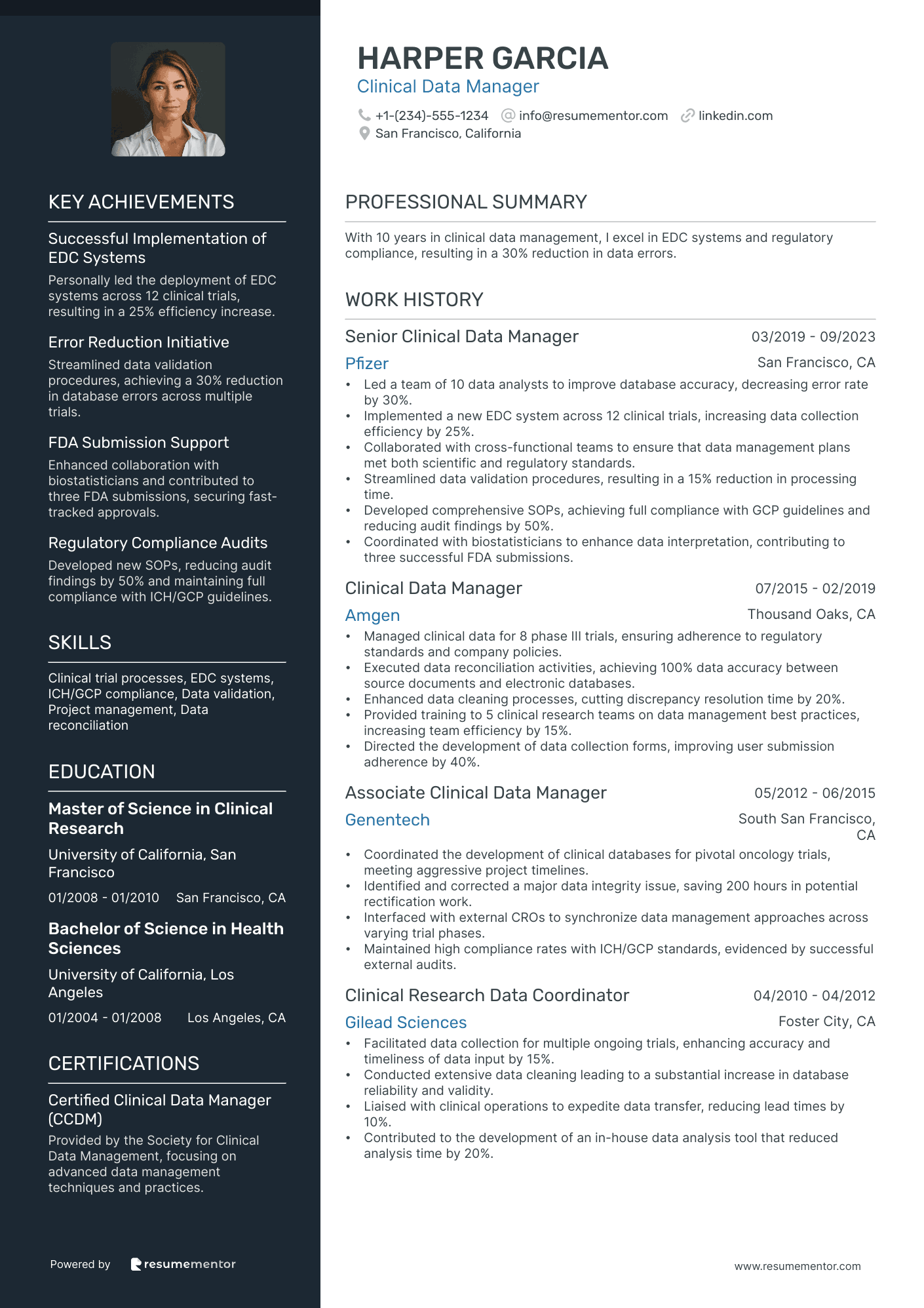
Clinical Data Manager
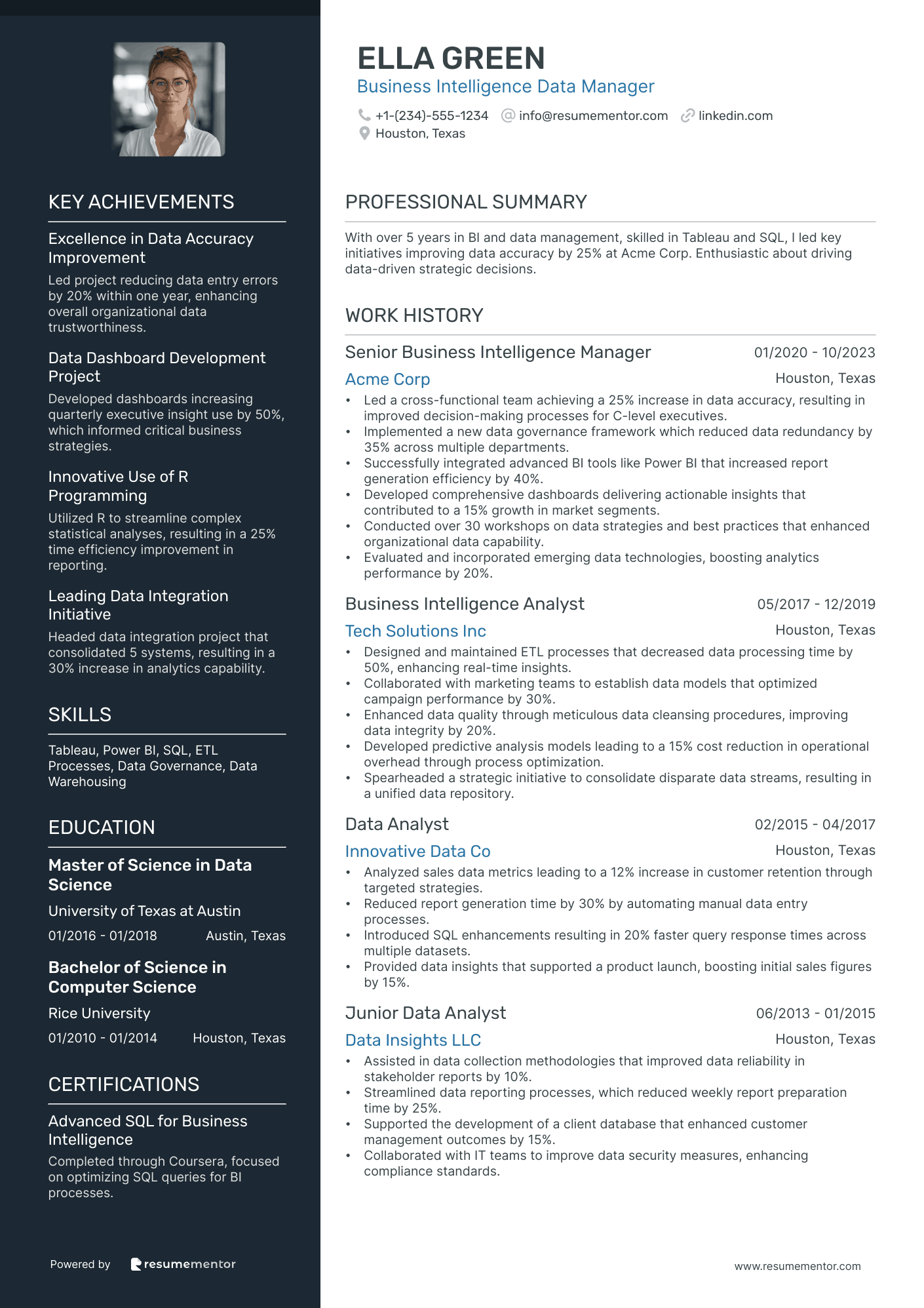
Business Intelligence Data Manager
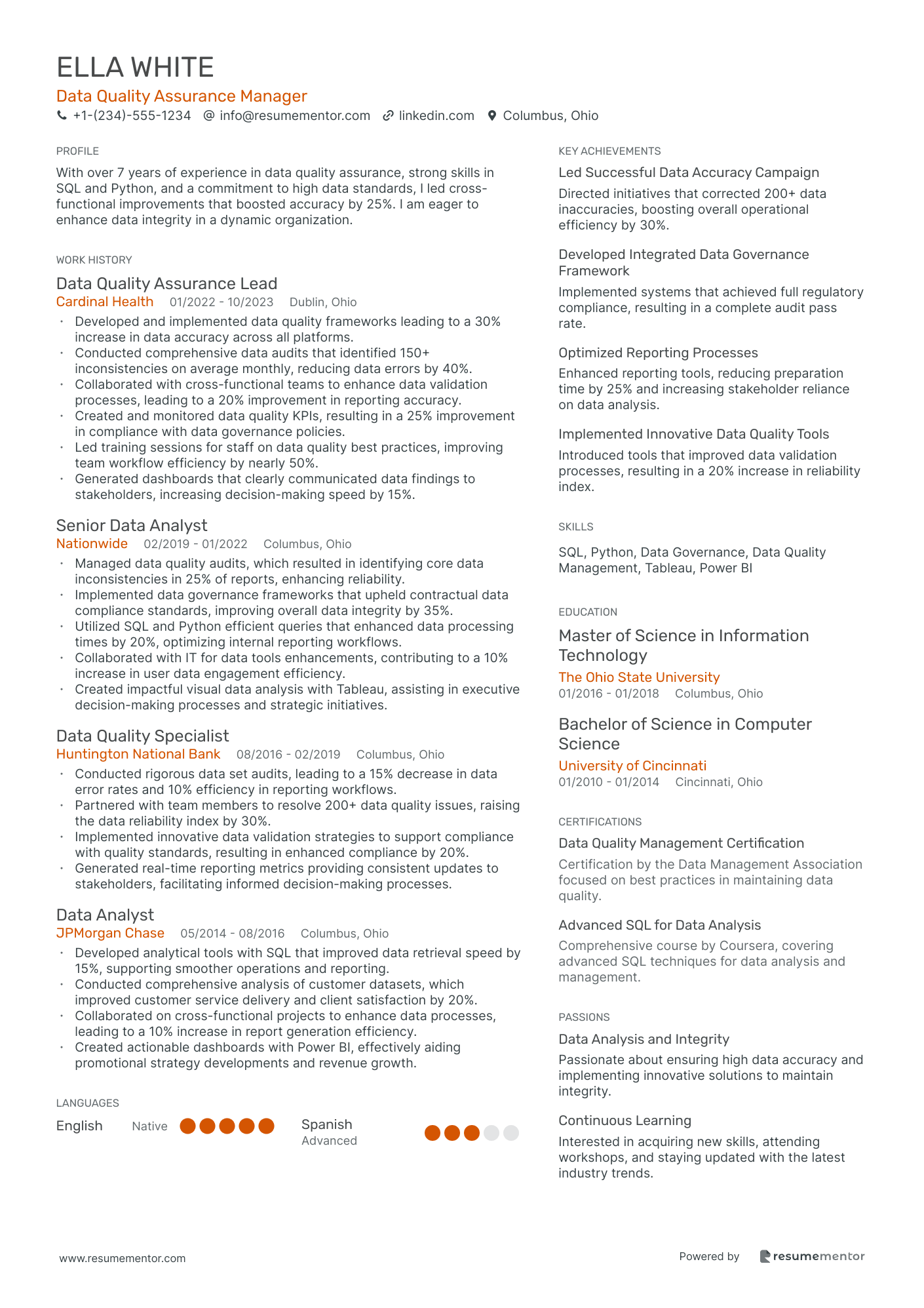
Data Quality Assurance Manager
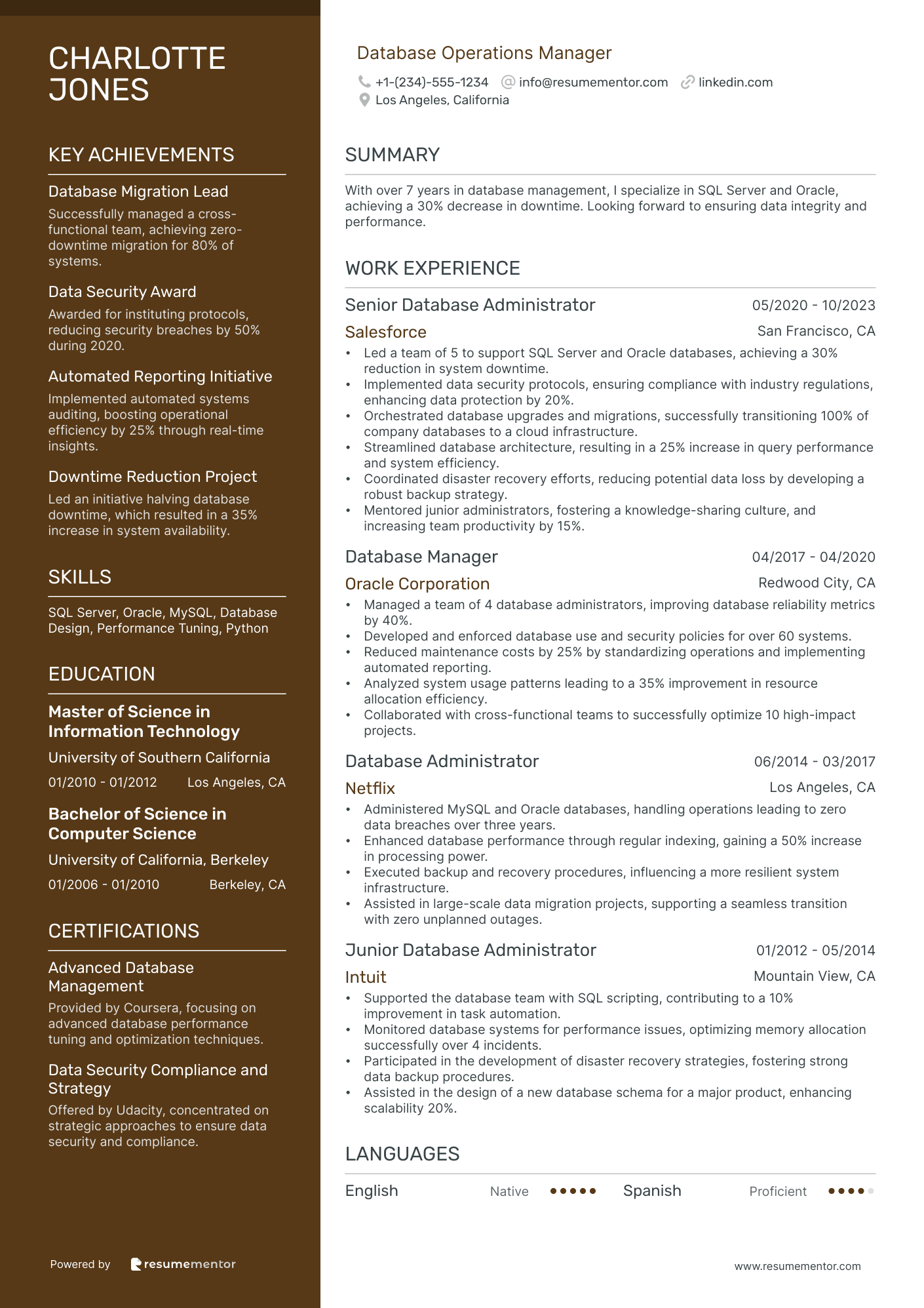
Database Operations Manager
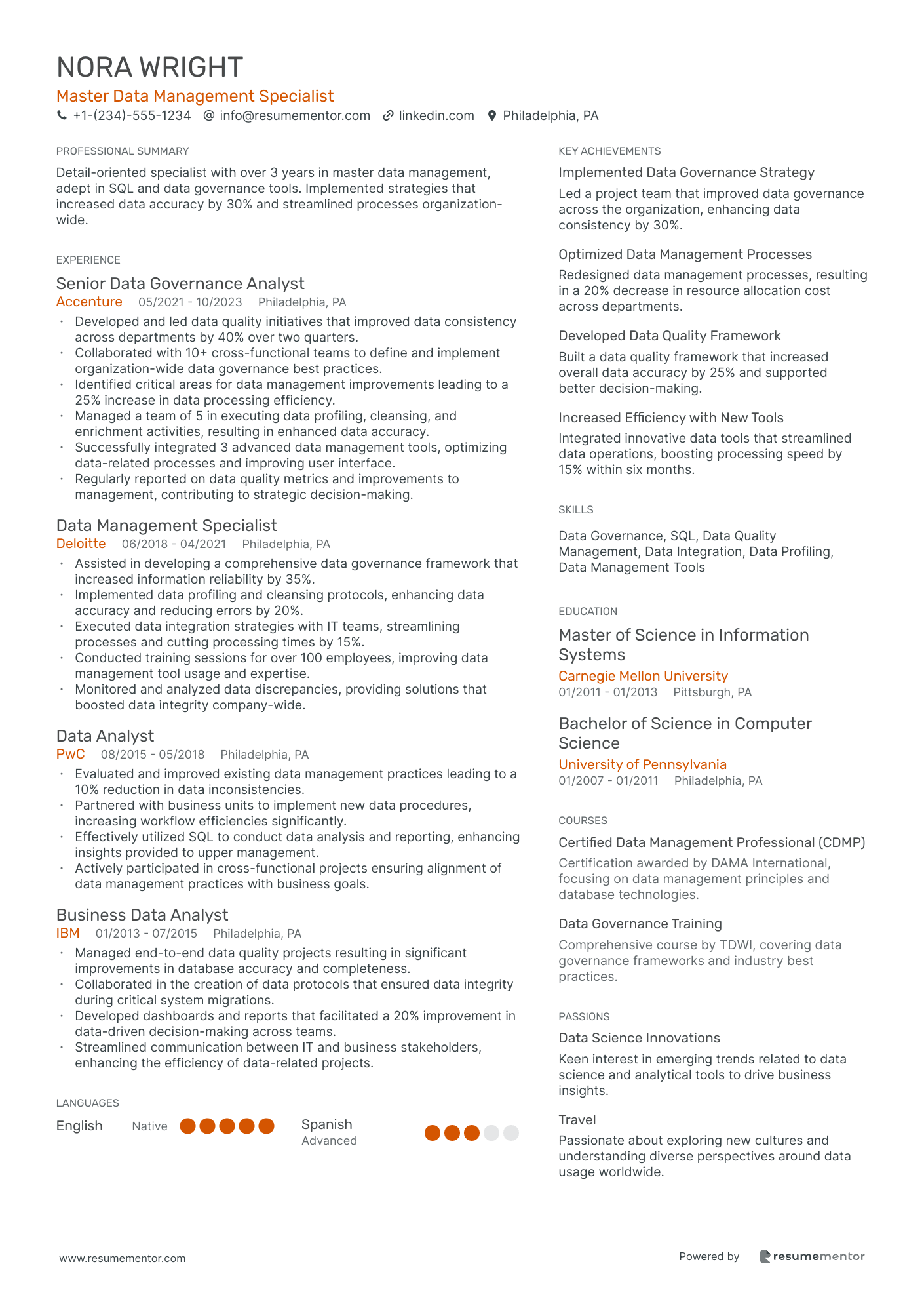
Master Data Management Specialist
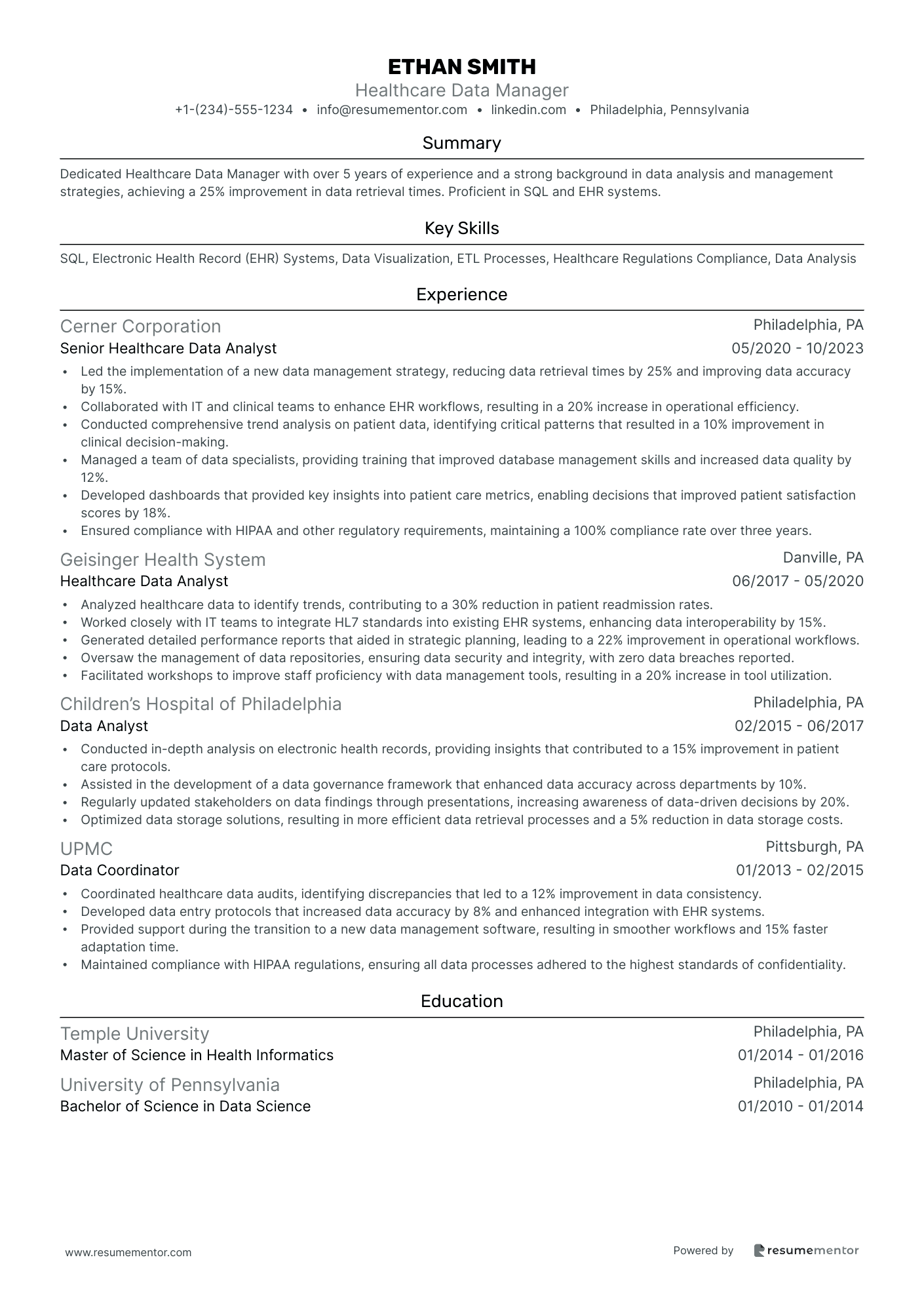
Healthcare Data Manager
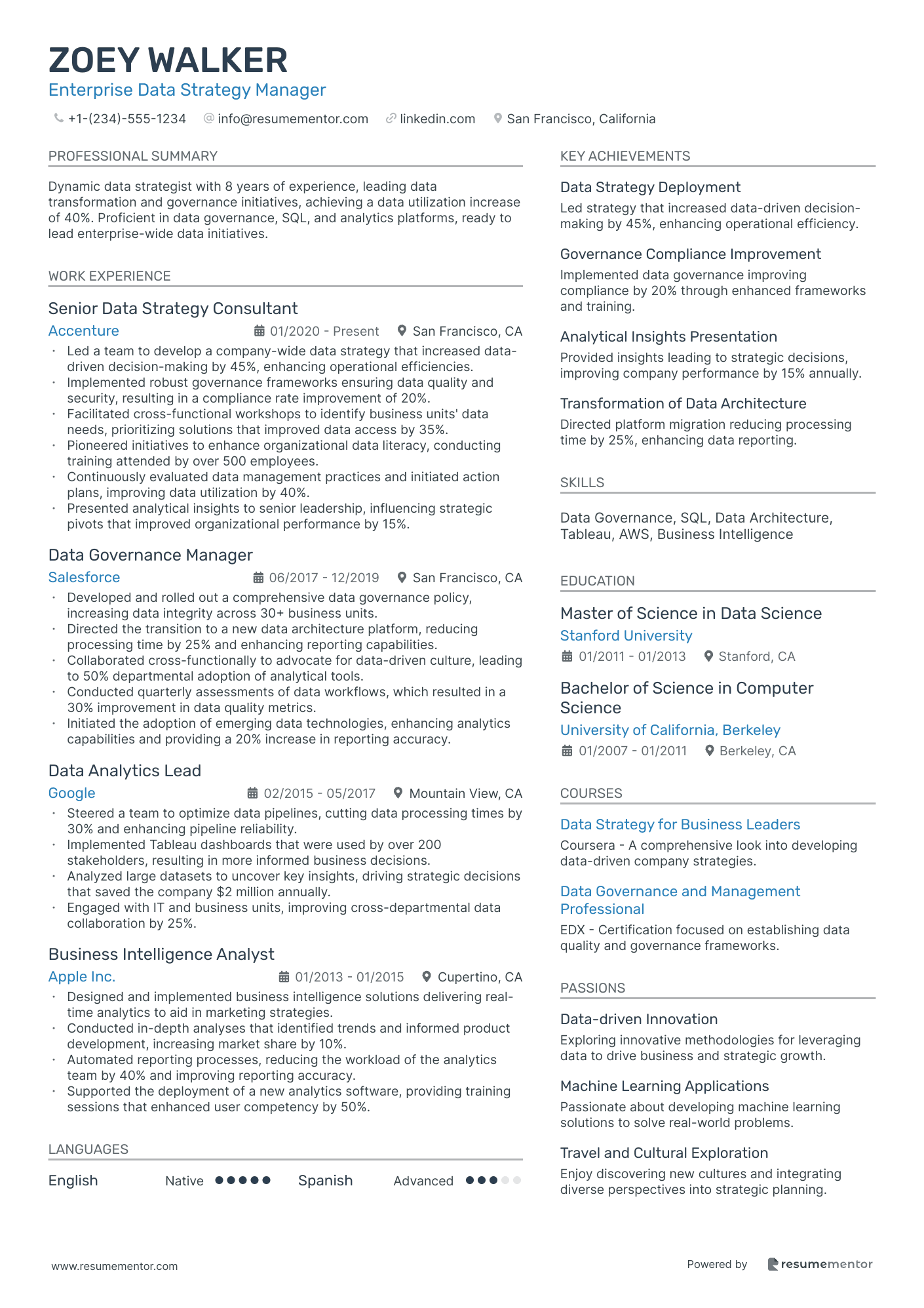
Enterprise Data Strategy Manager
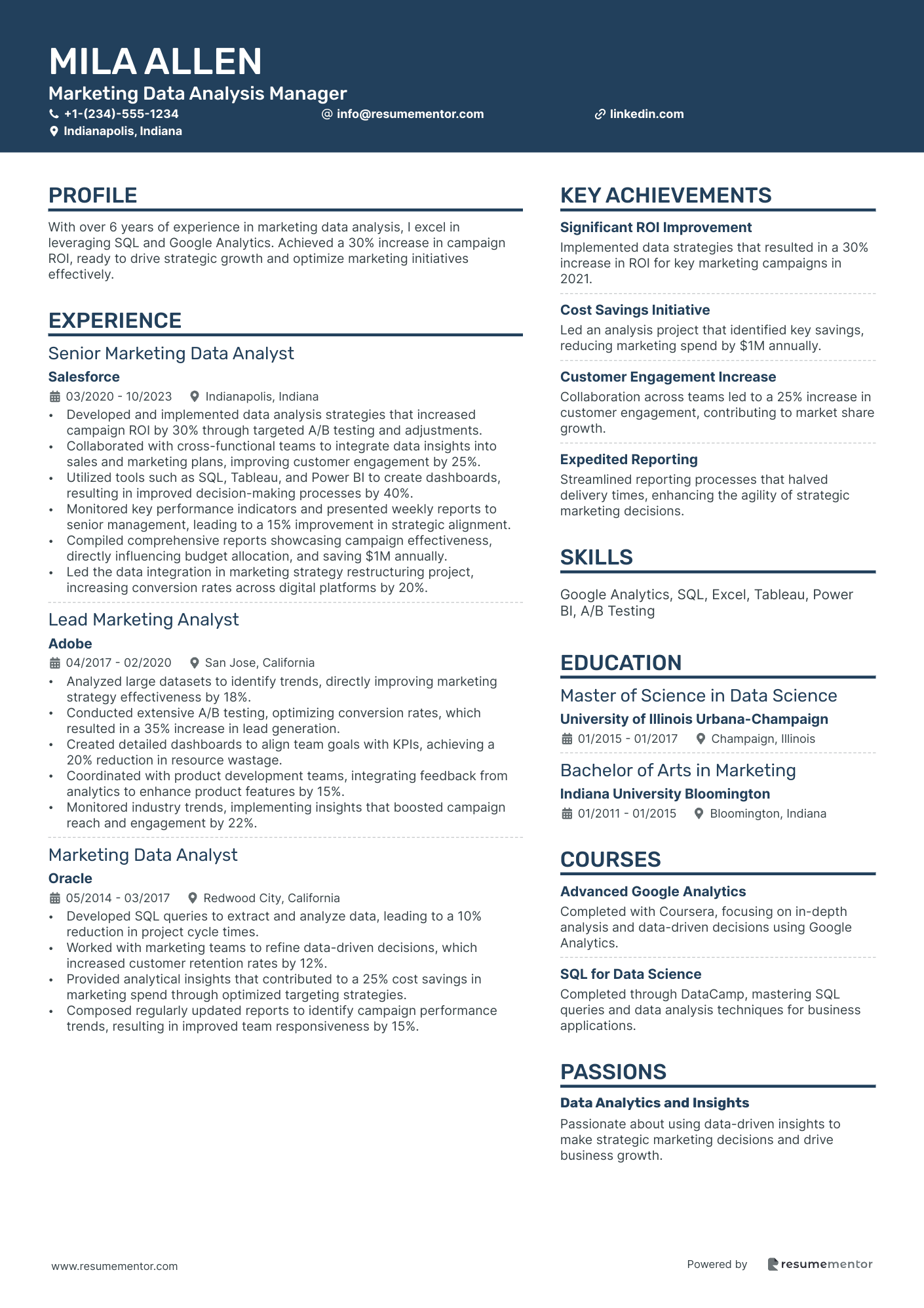
Marketing Data Analysis Manager
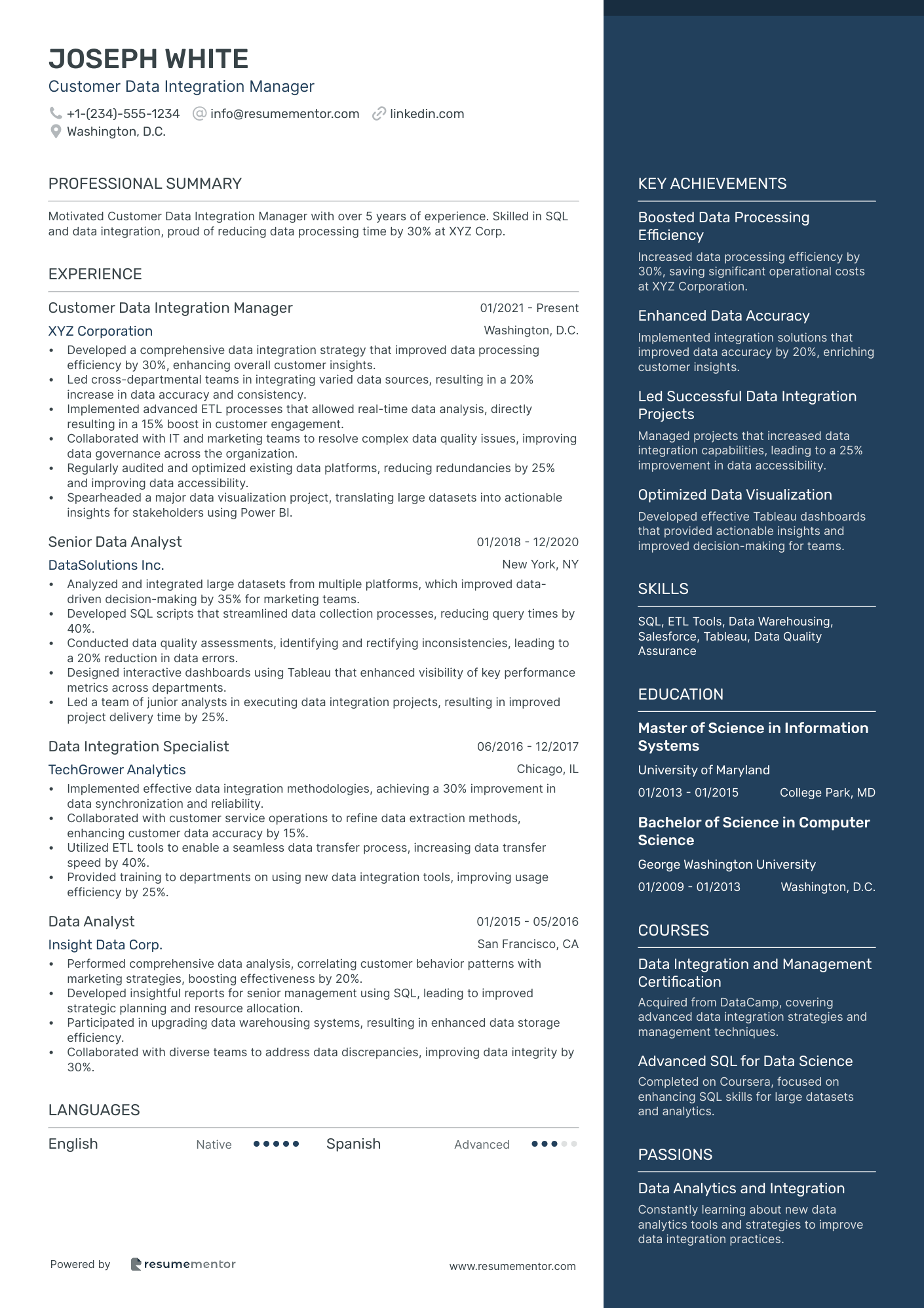
Customer Data Integration Manager

Data Governance Manager resume sample
- •Developed and refined a data governance framework that increased data quality compliance by 35% across key business units.
- •Led cross-functional teams in implementing data stewardship roles, improving collaboration and data accuracy by 40%.
- •Spearheaded data lineage and lifecycle process initiatives, resulting in a 25% reduction in data retrieval times.
- •Established data quality metrics, ensuring consistency and reliability that enhanced decision-making efficiency by 20%.
- •Facilitated over 50 data governance meetings to engage stakeholders, improving policy adherence by 30%.
- •Monitored industry trends, recommending a new data governance tool that reduced compliance risks by 15%.
- •Designed and implemented data governance policies, improving regulatory compliance by 30% across the organization.
- •Managed cross-functional data governance teams and defined data source ownership, cutting data errors by 25%.
- •Trained 200+ employees on data governance practices, enhancing corporate data stewardship culture significantly.
- •Devised data quality assessment tools that increased data accuracy and consistency, benefiting 5 key business functions.
- •Presented data governance reports to executives, aligning initiatives with business objectives and improving data utilization by 20%.
- •Assisted clients in developing data governance frameworks, achieving improved data integrity by 30%.
- •Conducted data quality audits, identifying key issues and reducing data cleansing costs by 15%.
- •Collaborated with legal teams to ensure data privacy compliance, addressing GDPR and CCPA regulations effectively.
- •Leveraged data management tools, increasing data tracking efficiencies by 20% across client projects.
- •Analyzed large datasets to improve business decisions, resulting in a 10% increase in strategic planning efficiency.
- •Worked on creating data lineage documentation, strengthening data trustworthiness within teams by 15%.
- •Implemented data validation checks to enhance data accuracy, reducing reporting errors by 12%.
- •Collaborated with IT to optimize database processes, improving data retrieval speeds by 25%.
Clinical Data Manager resume sample
- •Led a team of 10 data analysts to improve database accuracy, decreasing error rate by 30%.
- •Implemented a new EDC system across 12 clinical trials, increasing data collection efficiency by 25%.
- •Collaborated with cross-functional teams to ensure that data management plans met both scientific and regulatory standards.
- •Streamlined data validation procedures, resulting in a 15% reduction in processing time.
- •Developed comprehensive SOPs, achieving full compliance with GCP guidelines and reducing audit findings by 50%.
- •Coordinated with biostatisticians to enhance data interpretation, contributing to three successful FDA submissions.
- •Managed clinical data for 8 phase III trials, ensuring adherence to regulatory standards and company policies.
- •Executed data reconciliation activities, achieving 100% data accuracy between source documents and electronic databases.
- •Enhanced data cleaning processes, cutting discrepancy resolution time by 20%.
- •Provided training to 5 clinical research teams on data management best practices, increasing team efficiency by 15%.
- •Directed the development of data collection forms, improving user submission adherence by 40%.
- •Coordinated the development of clinical databases for pivotal oncology trials, meeting aggressive project timelines.
- •Identified and corrected a major data integrity issue, saving 200 hours in potential rectification work.
- •Interfaced with external CROs to synchronize data management approaches across varying trial phases.
- •Maintained high compliance rates with ICH/GCP standards, evidenced by successful external audits.
- •Facilitated data collection for multiple ongoing trials, enhancing accuracy and timeliness of data input by 15%.
- •Conducted extensive data cleaning leading to a substantial increase in database reliability and validity.
- •Liaised with clinical operations to expedite data transfer, reducing lead times by 10%.
- •Contributed to the development of an in-house data analysis tool that reduced analysis time by 20%.
Business Intelligence Data Manager resume sample
- •Led a cross-functional team achieving a 25% increase in data accuracy, resulting in improved decision-making processes for C-level executives.
- •Implemented a new data governance framework which reduced data redundancy by 35% across multiple departments.
- •Successfully integrated advanced BI tools like Power BI that increased report generation efficiency by 40%.
- •Developed comprehensive dashboards delivering actionable insights that contributed to a 15% growth in market segments.
- •Conducted over 30 workshops on data strategies and best practices that enhanced organizational data capability.
- •Evaluated and incorporated emerging data technologies, boosting analytics performance by 20%.
- •Designed and maintained ETL processes that decreased data processing time by 50%, enhancing real-time insights.
- •Collaborated with marketing teams to establish data models that optimized campaign performance by 30%.
- •Enhanced data quality through meticulous data cleansing procedures, improving data integrity by 20%.
- •Developed predictive analysis models leading to a 15% cost reduction in operational overhead through process optimization.
- •Spearheaded a strategic initiative to consolidate disparate data streams, resulting in a unified data repository.
- •Analyzed sales data metrics leading to a 12% increase in customer retention through targeted strategies.
- •Reduced report generation time by 30% by automating manual data entry processes.
- •Introduced SQL enhancements resulting in 20% faster query response times across multiple datasets.
- •Provided data insights that supported a product launch, boosting initial sales figures by 15%.
- •Assisted in data collection methodologies that improved data reliability in stakeholder reports by 10%.
- •Streamlined data reporting processes, which reduced weekly report preparation time by 25%.
- •Supported the development of a client database that enhanced customer management outcomes by 15%.
- •Collaborated with IT teams to improve data security measures, enhancing compliance standards.
Data Quality Assurance Manager resume sample
- •Developed and implemented data quality frameworks leading to a 30% increase in data accuracy across all platforms.
- •Conducted comprehensive data audits that identified 150+ inconsistencies on average monthly, reducing data errors by 40%.
- •Collaborated with cross-functional teams to enhance data validation processes, leading to a 20% improvement in reporting accuracy.
- •Created and monitored data quality KPIs, resulting in a 25% improvement in compliance with data governance policies.
- •Led training sessions for staff on data quality best practices, improving team workflow efficiency by nearly 50%.
- •Generated dashboards that clearly communicated data findings to stakeholders, increasing decision-making speed by 15%.
- •Managed data quality audits, which resulted in identifying core data inconsistencies in 25% of reports, enhancing reliability.
- •Implemented data governance frameworks that upheld contractual data compliance standards, improving overall data integrity by 35%.
- •Utilized SQL and Python efficient queries that enhanced data processing times by 20%, optimizing internal reporting workflows.
- •Collaborated with IT for data tools enhancements, contributing to a 10% increase in user data engagement efficiency.
- •Created impactful visual data analysis with Tableau, assisting in executive decision-making processes and strategic initiatives.
- •Conducted rigorous data set audits, leading to a 15% decrease in data error rates and 10% efficiency in reporting workflows.
- •Partnered with team members to resolve 200+ data quality issues, raising the data reliability index by 30%.
- •Implemented innovative data validation strategies to support compliance with quality standards, resulting in enhanced compliance by 20%.
- •Generated real-time reporting metrics providing consistent updates to stakeholders, facilitating informed decision-making processes.
- •Developed analytical tools with SQL that improved data retrieval speed by 15%, supporting smoother operations and reporting.
- •Conducted comprehensive analysis of customer datasets, which improved customer service delivery and client satisfaction by 20%.
- •Collaborated on cross-functional projects to enhance data processes, leading to a 10% increase in report generation efficiency.
- •Created actionable dashboards with Power BI, effectively aiding promotional strategy developments and revenue growth.
Database Operations Manager resume sample
- •Led a team of 5 to support SQL Server and Oracle databases, achieving a 30% reduction in system downtime.
- •Implemented data security protocols, ensuring compliance with industry regulations, enhancing data protection by 20%.
- •Orchestrated database upgrades and migrations, successfully transitioning 100% of company databases to a cloud infrastructure.
- •Streamlined database architecture, resulting in a 25% increase in query performance and system efficiency.
- •Coordinated disaster recovery efforts, reducing potential data loss by developing a robust backup strategy.
- •Mentored junior administrators, fostering a knowledge-sharing culture, and increasing team productivity by 15%.
- •Managed a team of 4 database administrators, improving database reliability metrics by 40%.
- •Developed and enforced database use and security policies for over 60 systems.
- •Reduced maintenance costs by 25% by standardizing operations and implementing automated reporting.
- •Analyzed system usage patterns leading to a 35% improvement in resource allocation efficiency.
- •Collaborated with cross-functional teams to successfully optimize 10 high-impact projects.
- •Administered MySQL and Oracle databases, handling operations leading to zero data breaches over three years.
- •Enhanced database performance through regular indexing, gaining a 50% increase in processing power.
- •Executed backup and recovery procedures, influencing a more resilient system infrastructure.
- •Assisted in large-scale data migration projects, supporting a seamless transition with zero unplanned outages.
- •Supported the database team with SQL scripting, contributing to a 10% improvement in task automation.
- •Monitored database systems for performance issues, optimizing memory allocation successfully over 4 incidents.
- •Participated in the development of disaster recovery strategies, fostering strong data backup procedures.
- •Assisted in the design of a new database schema for a major product, enhancing scalability 20%.
Master Data Management Specialist resume sample
- •Developed and led data quality initiatives that improved data consistency across departments by 40% over two quarters.
- •Collaborated with 10+ cross-functional teams to define and implement organization-wide data governance best practices.
- •Identified critical areas for data management improvements leading to a 25% increase in data processing efficiency.
- •Managed a team of 5 in executing data profiling, cleansing, and enrichment activities, resulting in enhanced data accuracy.
- •Successfully integrated 3 advanced data management tools, optimizing data-related processes and improving user interface.
- •Regularly reported on data quality metrics and improvements to management, contributing to strategic decision-making.
- •Assisted in developing a comprehensive data governance framework that increased information reliability by 35%.
- •Implemented data profiling and cleansing protocols, enhancing data accuracy and reducing errors by 20%.
- •Executed data integration strategies with IT teams, streamlining processes and cutting processing times by 15%.
- •Conducted training sessions for over 100 employees, improving data management tool usage and expertise.
- •Monitored and analyzed data discrepancies, providing solutions that boosted data integrity company-wide.
- •Evaluated and improved existing data management practices leading to a 10% reduction in data inconsistencies.
- •Partnered with business units to implement new data procedures, increasing workflow efficiencies significantly.
- •Effectively utilized SQL to conduct data analysis and reporting, enhancing insights provided to upper management.
- •Actively participated in cross-functional projects ensuring alignment of data management practices with business goals.
- •Managed end-to-end data quality projects resulting in significant improvements in database accuracy and completeness.
- •Collaborated in the creation of data protocols that ensured data integrity during critical system migrations.
- •Developed dashboards and reports that facilitated a 20% improvement in data-driven decision-making across teams.
- •Streamlined communication between IT and business stakeholders, enhancing the efficiency of data-related projects.
Healthcare Data Manager resume sample
- •Led the implementation of a new data management strategy, reducing data retrieval times by 25% and improving data accuracy by 15%.
- •Collaborated with IT and clinical teams to enhance EHR workflows, resulting in a 20% increase in operational efficiency.
- •Conducted comprehensive trend analysis on patient data, identifying critical patterns that resulted in a 10% improvement in clinical decision-making.
- •Managed a team of data specialists, providing training that improved database management skills and increased data quality by 12%.
- •Developed dashboards that provided key insights into patient care metrics, enabling decisions that improved patient satisfaction scores by 18%.
- •Ensured compliance with HIPAA and other regulatory requirements, maintaining a 100% compliance rate over three years.
- •Analyzed healthcare data to identify trends, contributing to a 30% reduction in patient readmission rates.
- •Worked closely with IT teams to integrate HL7 standards into existing EHR systems, enhancing data interoperability by 15%.
- •Generated detailed performance reports that aided in strategic planning, leading to a 22% improvement in operational workflows.
- •Oversaw the management of data repositories, ensuring data security and integrity, with zero data breaches reported.
- •Facilitated workshops to improve staff proficiency with data management tools, resulting in a 20% increase in tool utilization.
- •Conducted in-depth analysis on electronic health records, providing insights that contributed to a 15% improvement in patient care protocols.
- •Assisted in the development of a data governance framework that enhanced data accuracy across departments by 10%.
- •Regularly updated stakeholders on data findings through presentations, increasing awareness of data-driven decisions by 20%.
- •Optimized data storage solutions, resulting in more efficient data retrieval processes and a 5% reduction in data storage costs.
- •Coordinated healthcare data audits, identifying discrepancies that led to a 12% improvement in data consistency.
- •Developed data entry protocols that increased data accuracy by 8% and enhanced integration with EHR systems.
- •Provided support during the transition to a new data management software, resulting in smoother workflows and 15% faster adaptation time.
- •Maintained compliance with HIPAA regulations, ensuring all data processes adhered to the highest standards of confidentiality.
Enterprise Data Strategy Manager resume sample
- •Led a team to develop a company-wide data strategy that increased data-driven decision-making by 45%, enhancing operational efficiencies.
- •Implemented robust governance frameworks ensuring data quality and security, resulting in a compliance rate improvement of 20%.
- •Facilitated cross-functional workshops to identify business units' data needs, prioritizing solutions that improved data access by 35%.
- •Pioneered initiatives to enhance organizational data literacy, conducting training attended by over 500 employees.
- •Continuously evaluated data management practices and initiated action plans, improving data utilization by 40%.
- •Presented analytical insights to senior leadership, influencing strategic pivots that improved organizational performance by 15%.
- •Developed and rolled out a comprehensive data governance policy, increasing data integrity across 30+ business units.
- •Directed the transition to a new data architecture platform, reducing processing time by 25% and enhancing reporting capabilities.
- •Collaborated cross-functionally to advocate for data-driven culture, leading to 50% departmental adoption of analytical tools.
- •Conducted quarterly assessments of data workflows, which resulted in a 30% improvement in data quality metrics.
- •Initiated the adoption of emerging data technologies, enhancing analytics capabilities and providing a 20% increase in reporting accuracy.
- •Steered a team to optimize data pipelines, cutting data processing times by 30% and enhancing pipeline reliability.
- •Implemented Tableau dashboards that were used by over 200 stakeholders, resulting in more informed business decisions.
- •Analyzed large datasets to uncover key insights, driving strategic decisions that saved the company $2 million annually.
- •Engaged with IT and business units, improving cross-departmental data collaboration by 25%.
- •Designed and implemented business intelligence solutions delivering real-time analytics to aid in marketing strategies.
- •Conducted in-depth analyses that identified trends and informed product development, increasing market share by 10%.
- •Automated reporting processes, reducing the workload of the analytics team by 40% and improving reporting accuracy.
- •Supported the deployment of a new analytics software, providing training sessions that enhanced user competency by 50%.
Marketing Data Analysis Manager resume sample
- •Developed and implemented data analysis strategies that increased campaign ROI by 30% through targeted A/B testing and adjustments.
- •Collaborated with cross-functional teams to integrate data insights into sales and marketing plans, improving customer engagement by 25%.
- •Utilized tools such as SQL, Tableau, and Power BI to create dashboards, resulting in improved decision-making processes by 40%.
- •Monitored key performance indicators and presented weekly reports to senior management, leading to a 15% improvement in strategic alignment.
- •Compiled comprehensive reports showcasing campaign effectiveness, directly influencing budget allocation, and saving $1M annually.
- •Led the data integration in marketing strategy restructuring project, increasing conversion rates across digital platforms by 20%.
- •Analyzed large datasets to identify trends, directly improving marketing strategy effectiveness by 18%.
- •Conducted extensive A/B testing, optimizing conversion rates, which resulted in a 35% increase in lead generation.
- •Created detailed dashboards to align team goals with KPIs, achieving a 20% reduction in resource wastage.
- •Coordinated with product development teams, integrating feedback from analytics to enhance product features by 15%.
- •Monitored industry trends, implementing insights that boosted campaign reach and engagement by 22%.
- •Developed SQL queries to extract and analyze data, leading to a 10% reduction in project cycle times.
- •Worked with marketing teams to refine data-driven decisions, which increased customer retention rates by 12%.
- •Provided analytical insights that contributed to a 25% cost savings in marketing spend through optimized targeting strategies.
- •Composed regularly updated reports to identify campaign performance trends, resulting in improved team responsiveness by 15%.
- •Implemented analytics tools to measure digital campaign success, increasing conversion rates by 40%.
- •Enhanced reporting accuracy and speed by developing automated dashboards, reducing report generation time by 50%.
- •Collaborated with sales to refine target demographics, leading to a 20% boost in customer acquisition.
- •Maintained up-to-date marketing KPI dashboards, providing actionable insights that increased campaign efficacy by 18%.
Customer Data Integration Manager resume sample
- •Developed a comprehensive data integration strategy that improved data processing efficiency by 30%, enhancing overall customer insights.
- •Led cross-departmental teams in integrating varied data sources, resulting in a 20% increase in data accuracy and consistency.
- •Implemented advanced ETL processes that allowed real-time data analysis, directly resulting in a 15% boost in customer engagement.
- •Collaborated with IT and marketing teams to resolve complex data quality issues, improving data governance across the organization.
- •Regularly audited and optimized existing data platforms, reducing redundancies by 25% and improving data accessibility.
- •Spearheaded a major data visualization project, translating large datasets into actionable insights for stakeholders using Power BI.
- •Analyzed and integrated large datasets from multiple platforms, which improved data-driven decision-making by 35% for marketing teams.
- •Developed SQL scripts that streamlined data collection processes, reducing query times by 40%.
- •Conducted data quality assessments, identifying and rectifying inconsistencies, leading to a 20% reduction in data errors.
- •Designed interactive dashboards using Tableau that enhanced visibility of key performance metrics across departments.
- •Led a team of junior analysts in executing data integration projects, resulting in improved project delivery time by 25%.
- •Implemented effective data integration methodologies, achieving a 30% improvement in data synchronization and reliability.
- •Collaborated with customer service operations to refine data extraction methods, enhancing customer data accuracy by 15%.
- •Utilized ETL tools to enable a seamless data transfer process, increasing data transfer speed by 40%.
- •Provided training to departments on using new data integration tools, improving usage efficiency by 25%.
- •Performed comprehensive data analysis, correlating customer behavior patterns with marketing strategies, boosting effectiveness by 20%.
- •Developed insightful reports for senior management using SQL, leading to improved strategic planning and resource allocation.
- •Participated in upgrading data warehousing systems, resulting in enhanced data storage efficiency.
- •Collaborated with diverse teams to address data discrepancies, improving data integrity by 30%.
Crafting your data manager resume can often feel like navigating a complex data set: intricate, detailed, and crucial. With your analytical skills at the core of your career, it's important to translate these onto paper effectively. A well-structured resume becomes your key tool to highlight your expertise in data analysis, management systems, and data governance.
In today's competitive job market, simply listing skills isn't enough. You need to transform your accomplishments and technical know-how into a clear and compelling narrative. This is where a resume template comes in handy. It provides a strong foundation, allowing you to focus on showcasing your unique value while ensuring your resume remains easy to read and professional.
Think of your resume as a mirror reflecting your career journey: it should be organized, precise, and impactful. By clearly presenting your skills and experiences, you guide future employers to recognize your potential. Putting effort into crafting a polished resume can make all the difference in securing your next role as a data manager.
Key Takeaways
- Crafting a data manager resume requires translating analytical skills into a structured format to effectively communicate expertise in data analysis, management systems, and data governance.
- Using a resume template helps focus on showcasing unique value, making the resume easy to read and professional.
- Highlight strengths in data analysis, database management, and data privacy regulations, demonstrating a successful track record to drive organizational success.
- Choosing the right resume format, preferably reverse-chronological, and ensuring proper formatting with fonts and PDF files enhances readability and maintains integrity across platforms.
- Include quantifiable achievements in experience sections and tailor the entire resume with specific skills and relevant education details to match job descriptions.
What to focus on when writing your data manager resume
Your data manager resume should effectively convey your expertise in handling and optimizing large data sets. It should highlight your strengths in areas like data analysis and database management, as well as your understanding of data privacy regulations. Demonstrating a successful track record of managing data systems and enhancing data quality is essential to showcase your potential to drive organizational success.
How to structure your data manager resume
- Contact Information—Ensure your contact details are current and professional. Use a personal email address that incorporates your name rather than a nickname. Including your LinkedIn profile allows recruiters to quickly access your professional network and endorsements, adding another layer to their understanding of your qualifications.
- Professional Summary—Craft this section to provide an engaging overview of your experience and unique qualities as a data manager. Focus on highlighting your key strengths, remarkable successes, and industry-specific achievements. This summary should set the tone for the rest of your resume, making recruiters eager to learn more about your journey.
- Work Experience—Detail your professional journey in data management with precise focus on results and initiatives. Describe your roles, responsibilities, and the impact you made in each position. Whether you optimized a database system or led a data quality initiative, make sure to quantify your achievements whenever possible to give recruiters a clearer picture of your capabilities.
- Education—Highlight your academic background, concentrating on areas most relevant to the data management field. Include degrees in computer science, IT, or data management, and showcase any notable academic projects or thesis work. Highlighting certifications like SQL or data analysis will also bolster your standing as an expert in your field.
- Skills—This section should target the technical competencies essential to a data manager role. Include your proficiency with specific data management software, SQL, data warehousing, and data visualization tools. Additionally, express your familiarity with data privacy laws such as GDPR or CCPA, emphasizing your dedication to compliance and ethical data practices.
We will cover each section in more detail below to ensure your resume is both comprehensive and compelling.
Which resume format to choose
As a data manager, your ability to organize and analyze data underpins the importance of a clear and effective resume format. A reverse-chronological format is ideal for this role, as it allows you to prominently display your most recent experiences and accomplishments. This helps employers quickly understand your career trajectory and gives context to the data management skills you've honed over time.
When it comes to fonts, opting for Raleway, Lato, or Montserrat adds a touch of modernity while maintaining clarity, which is essential for a role that revolves around precision and detail. These fonts not only present your information professionally but also enhance readability, helping convey the meticulous nature of your work.
Saving your resume as a PDF ensures that your carefully arranged content remains exactly as intended on all devices. PDFs prevent formatting issues that can arise with other file types, making them the best choice to maintain the integrity of your resume's presentation.
Finally, thoughtful use of one-inch margins ensures ample white space, enhancing readability and preventing your resume from appearing cluttered. This attention to detail reflects your organizational skills, a key attribute in data management, thus reinforcing your suitability for the role.
Incorporating these elements thoughtfully communicates your professionalism and expertise, making your resume a powerful tool in your job search.
How to write a quantifiable resume experience section
To create a compelling data manager experience section, it's important to focus on how your data handling skills have made a real impact in previous roles. This section plays a crucial role by highlighting your accomplishments and expertise, proving to employers that you're the candidate they need. Start by listing your experiences in reverse chronological order, focusing on the last 10 to 15 years to keep everything relevant. Tailoring your resume to fit the specific job you're applying for is key. By aligning your experiences with the job description and using action verbs like "optimized," "managed," "analyzed," or "developed," you clearly showcase your skills and accomplishments, painting a clear picture of your capabilities.
- •Boosted data processing efficiency by 30% with new protocols.
- •Cut data retrieval time by 25%, speeding up decision-making.
- •Led a team of 5 to develop a data warehouse, expanding storage by 50%.
- •Increased data accuracy by 20% with advanced validation processes.
This experience section stands out because it seamlessly connects your professional achievements with quantifiable outcomes, proving your value to the company. Each bullet point clearly demonstrates how your efforts led to measurable improvements, like enhancing efficiency and reducing retrieval times, which are critical to decision-making processes. By carefully aligning these points with the role's requirements, you provide a cohesive narrative that captures the employer's attention. Action verbs at the start of each bullet not only indicate initiative but also create a dynamic flow, reinforcing the expertise and leadership expected in a skilled data manager. This thoughtful structuring ensures your experience is portrayed as both comprehensive and impactful, showing how you directly contributed to the company's success.
Customer-Focused resume experience section
A Customer-Focused Data Manager resume experience section should spotlight your ability to truly understand and fulfill customer needs. Begin by listing relevant roles where customer service was key, organizing them chronologically. As a data manager, your work likely involved closely collaborating with various teams to ensure a seamless customer experience. Emphasize accomplishments with measurable results, like boosting satisfaction scores or reducing response times, to show how your skills effectively enhanced interactions and retention.
Dive into how you proactively tackled customer service challenges, showcasing any innovative strategies you developed to improve data accuracy and efficiency. These improvements ultimately benefited customer satisfaction. Use bullet points to enumerate specific achievements, such as successfully resolving a significant percentage of customer complaints or spearheading projects that upgraded data processes. Aim to maintain a simple and direct language throughout while using dynamic action verbs and maintaining a positive and professional tone.
Data Manager
Tech Solutions Inc.
June 2020 - Present
- Collaborated with teams to boost customer satisfaction by 15% through data-driven strategies.
- Implemented a new data management process, decreasing response times by 30%.
- Trained team members to enhance their customer service and data management skills.
- Led a project that streamlined data collection, improving accuracy and customer experience.
Result-Focused resume experience section
A result-focused data manager resume experience section should highlight measurable achievements and the value you have brought to your roles. Begin by stating your employment dates and job title, ensuring a consistent format throughout your resume. Use dynamic action verbs and quantify your outcomes to emphasize your accomplishments. When crafting bullet points, clearly show what you did, how you achieved it, and the positive impact of your work. By doing this, you not only capture attention but also demonstrate the tangible value of your contributions.
To bring your experience to life, zero in on specific projects or challenges you have faced and the strategies you employed to tackle them. Discuss the methods you used to streamline processes, boost efficiency, or achieve cost savings, making sure to back these achievements with numbers and percentages. This approach provides a clearer picture of your effectiveness. Keep your sentences concise and readable, ensuring each point logically builds on the last. Structure your experience section to guide the reader smoothly through your professional journey.
Senior Data Manager
Tech Innovations Corp
2018-2023
- Implemented a new data analysis system that increased processing speed by 30%, resulting in faster decision-making.
- Led a team of 5 in a project that reduced data redundancy by 40%, saving the company $150,000 annually.
- Developed a data visualization tool that improved reporting accuracy, enhancing stakeholder insight and comprehension by 25%.
- Streamlined data entry processes, reducing errors by 50% and increasing team efficiency by automating repetitive tasks.
Collaboration-Focused resume experience section
A collaboration-focused data manager resume experience section should clearly demonstrate your ability to work seamlessly with others to drive success. Start by highlighting instances where your collaborative efforts made a significant impact. Think about the times you effectively joined forces with diverse teams, managed projects, or served as a vital link between departments. These examples should use bullet points to articulate your responsibilities and achievements, emphasizing how your teamwork contributed to the company's goals and led to measurable outcomes.
Connect these experiences by detailing specific situations where your efforts directly influenced company objectives. Each bullet point should tell a cohesive story, from your role in the project to the concrete results achieved. This approach helps potential employers understand the value you can bring to their organization. Keep the language straightforward and direct, making sure it underscores the importance of your role in fostering collaborative success.
Lead Data Manager
Insight Tech Solutions
March 2020 - Present
- Led a team of data analysts to create a centralized data repository, which improved access to vital company insights and boosted collaboration across departments.
- Facilitated weekly meetings with IT, finance, and operations teams to keep data-related projects aligned, resulting in a 25% increase in workflow efficiency.
- Worked closely with product development teams to provide data-driven insights that guided new product launches, capturing 15% more of the market.
- Developed and conducted training sessions for staff in various departments on best practices in data management, which reduced errors by 30%.
Training and Development Focused resume experience section
A training and development-focused data manager resume experience section should clearly illustrate your expertise in designing impactful training programs that elevate team performance. Start by highlighting key experiences where your efforts led to tangible improvements, ensuring these initiatives align with the broader goals of your company. Discuss the context in which you developed these programs, emphasizing your role in promoting continuous learning and fostering a supportive environment for growth.
Provide specific examples to illustrate how you identified and addressed talent gaps, tailoring learning paths that met these needs effectively. Incorporate quantifiable achievements to demonstrate the success of your programs, while maintaining straightforward language to ensure clarity for any hiring manager. By focusing on the outcomes and innovations you've driven, you can underscore your leadership and adaptability in guiding teams through developmental challenges and changes.
Data Manager
Tech Innovators Inc.
January 2018 - Present
- Designed and implemented a data management training program that reduced processing errors by 30%, enhancing team performance.
- Collaborated with senior management to pinpoint crucial training areas, leading to a 25% increase in overall efficiency.
- Developed dynamic training materials, like videos and manuals, to cater to various learning styles within the team.
- Facilitated monthly workshops that updated staff on the latest industry practices and emerging data tools, sustaining a high standard of knowledge.
Write your data manager resume summary section
A data-focused resume summary should instantly capture a hiring manager’s attention by highlighting your skills and achievements. This section offers a quick snapshot of your expertise and what makes you a standout data manager. Keep it brief—two or three sentences that emphasize your top accomplishments and the value you bring to a company. Here's an example:
This summary effectively captures your professional essence by highlighting a notable 20% increase in earnings, which can be attributed to your adept use of analytical tools and your leadership in team settings. Adding a touch of personal passion for delivering insights not only showcases your enthusiasm but also aligns with what many employers seek. By blending your experiences, achievements, and passion into this snapshot, your summary becomes a compelling introduction.
When crafting your resume, understanding the various sections helps in tailoring it to the job. A resume summary highlights your current career status and value proposition. In contrast, a resume objective outlines your career aspirations and what you hope to accomplish. A resume profile generally describes your skills and professional approach, while a summary of qualifications lists key abilities and credentials. Recognizing these differences enables you to customize your resume effectively, ensuring it resonates with potential employers and sets you apart.
Listing your data manager skills on your resume
A skills-focused data manager resume should weave your capabilities throughout the entire document, ensuring that your strengths shine through. You can opt for a distinct skills section, or strategically integrate them within other areas like your experience and summary. This strategy helps underline your talents, creating a powerful impression of your abilities across the board.
In terms of what you bring to the table, strengths include your soft skills, such as effective communication and teamwork. These are complemented by hard skills, the specific abilities you've acquired over time—think data modeling or SQL proficiency. Introducing these skills and strengths on your resume not only paints a complete picture of your qualifications, but these also serve as critical keywords that align with job descriptions and attract employer attention.
Here's an example of a precisely crafted skills section for a data manager:
This skills section is designed to be impactful and relevant. It lists skills that are key for any data manager role, ensuring that each entry is carefully selected to reflect essential qualifications. Including specific terms like "SQL" and "ETL Processes" makes your resume more likely to pass through applicant scanning systems, which frequently look for these exact keywords.
Best hard skills to feature on your data manager resume
In your resume, highlighting hard skills is essential. These technical skills showcase your practical abilities in data management, emphasizing your proficiency in critical tools and processes.
Hard Skills
- SQL
- Data Analysis
- Database Management
- Data Modeling
- ETL Processes
- Data Warehousing
- Business Intelligence
- Data Visualization
- Data Quality Assurance
- Big Data Technologies
- Data Mining
- Data Governance
- Programming Languages (Python, R)
- Cloud Computing (AWS, Azure)
- Statistical Analysis
Best soft skills to feature on your data manager resume
Your resume should also convey soft skills, focusing on your interpersonal and problem-solving abilities. These abilities reflect how well you collaborate with others and manage projects effectively.
Soft Skills
- Communication
- Problem-solving
- Attention to Detail
- Leadership
- Time Management
- Critical Thinking
- Teamwork
- Adaptability
- Decision-making
- Conflict Resolution
- Creativity
- Organizational Skills
- Networking
- Multitasking
- Strategic Thinking
How to include your education on your resume
An education section is a pivotal part of your data manager resume. It highlights your academic achievements and serves as a foundation for your qualifications. It's essential to tailor this section to the job you're applying for, excluding any irrelevant education that doesn't pertain to the role. When listing your degree, you should include the name of the degree, the institution, and the dates of attendance. If your GPA was particularly strong, you might want to include that, but make sure to format it with the GPA first, followed by the maximum possible and note if it's "cum laude" or higher.
Wrong example:
Right example:
This second example is effective because it showcases a degree directly aligned with a data manager role. The inclusion of a high GPA and the "magna cum laude" honor reflects excellence and dedication. These details matter to potential employers seeking candidates with proven analytical and quantitative skills. Additionally, the education dates support realistic timing for this career path. The focus remains solely on relevant education, communicating competence and readiness for the position.
How to include data manager certificates on your resume
Including a certificates section in your resume is crucial for showcasing your qualifications as a data manager. List the name of the certificate, include the date, and add the issuing organization for each certificate. You could also feature your credentials in the header with your name. For example: "Jane Doe, Certified Data Manager, PMP".
Listing certificates in a dedicated section allows employers to quickly see your qualifications. Relevant certifications show your commitment and expertise in the field. This can set you apart from other candidates. A strong certificates section can boost your credibility.
This example is effective because it lists certifications relevant to a data manager role. Each certificate is clearly titled, making it easy for the employer to assess your qualifications. The issuing organizations are reputed, adding to your credibility. This format is concise but informative, giving a quick yet comprehensive view of your certifications.
Extra sections to include in your data manager resume
Are you looking to create a standout resume for a data manager position? Including various sections like language skills, hobbies and interests, volunteer work, and books can make your resume more compelling. These sections add depth and dimension to your professional profile, giving potential employers a holistic view of your capabilities and personality.
Language section — Show off language skills to highlight communication abilities. This can be crucial for roles requiring data analysis in a global context.
Hobbies and interests section — Display personal interests to make your resume more relatable. This can also subtly show skills that may be useful in a data manager role, like analytical thinking or problem-solving.
Volunteer work section — Add volunteer work to demonstrate commitment and social responsibility. It also shows that you can manage your time well and take initiative outside of your professional duties.
Books section — List books you’ve read about data management or related fields to highlight your dedication to continuous learning. It signals to employers that you are proactive about staying updated in your field.
In Conclusion
In conclusion, crafting a data manager resume requires a strategic approach that effectively communicates your technical skills and professional achievements. It’s essential to present your data management expertise clearly, making sure your resume narrates your career story in a compelling manner. While using a resume template can give you a strong start, tailoring each section to highlight your unique contributions and skills ensures your resume stands out. From contact information to certifications, every detail should work toward illustrating your qualifications in data analysis and governance. Choosing the right format, like reverse-chronological, allows potential employers to easily see your career progression. Integrating quantifiable achievements in your experience section demonstrates your impact and effectiveness as a data manager. A well-crafted skills section should include technical abilities such as SQL proficiency as well as soft skills like communication and teamwork, painting a complete picture of your capabilities. Educational background and certifications further solidify your credentials, while extra sections like languages or hobbies can add a personal touch. By carefully considering these elements, your resume will not only capture what you've done but also what you can offer, positioning you as the ideal candidate for any data manager role.
Related Articles

Continue Reading
Check more recommended readings to get the job of your dreams.
Resume
Resources
Tools
© 2026. All rights reserved.
Made with love by people who care.

